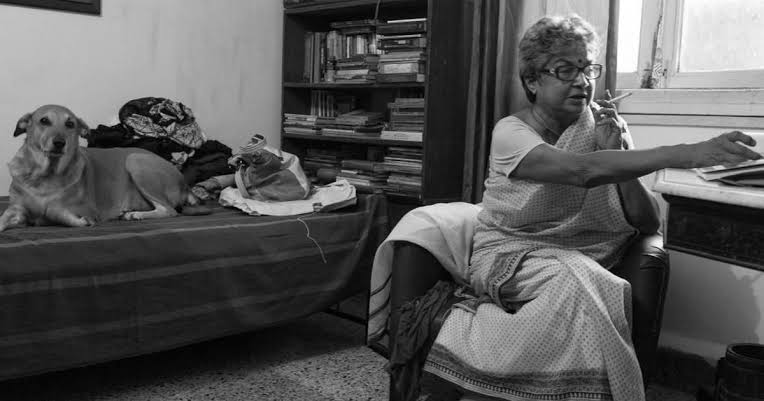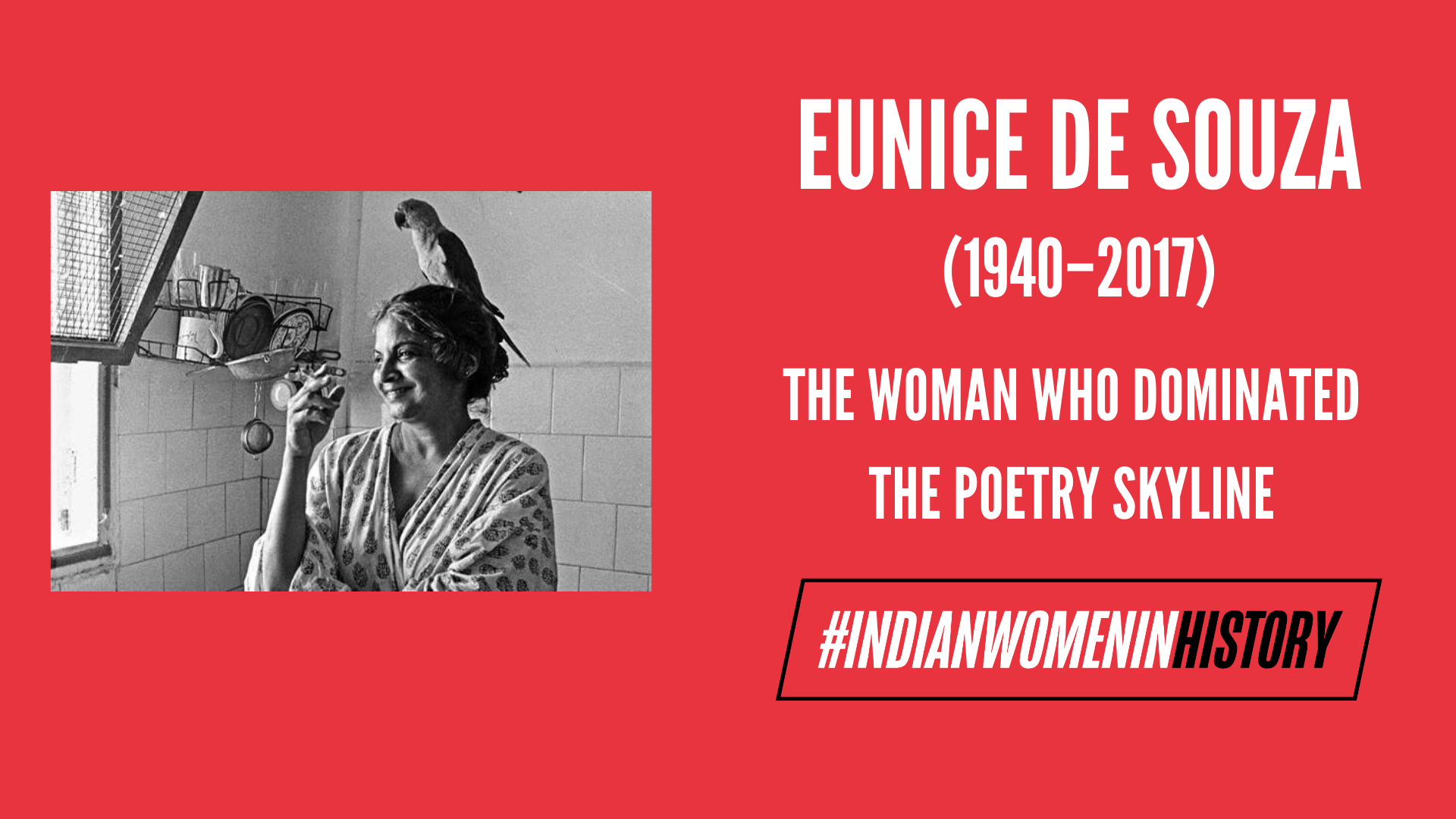Eunice de Souza has been widely acknowledged as the one of the best Indian poets writing in English. She was a a poet, novelist, leading literary critic born in 1940 and raised in Pune, in a Goan Catholic family. She lost her father at the early age of three. Her early education took place in Pune.

She went on to study English Literature with a masters from Marquette University, Wisconsin and a PhD from the University of Mumbai. She took on a teaching position at St. Xavier’s College in Mumbai and was the Head of the Department of English, where she worked for 30 years until her retirement.

Eunice de Souza has written and published a range of writings including the novels Dangerlok (2001) and Dev And Simran (2003), four children’s books and poetry collections. Dangerlok follows Rina Ferreira a middle-aged lecturer in English literature and poet as she negotiates life as a single woman in Mumbai. Dev And Simran is a moving tale about a couple living in the heart of Bombay and grappling with everyday married life and the loss of a child. She has also edited numerous books and has written a weekly column for the Mumbai Mirror covering a range of issues from literature, history, politics to personal experiences. Her well known English poetry collections include Fix (1979), Women in Dutch Painting (1988), Ways of Belonging (1990), ‘A Necklace of Skulls’(2009) and ‘Learn from the Almond Leaf’ (2016).

Eunice de Souza was the only Indian woman to be included in the Oxford India Anthology of Twelve Modern Indian Poets (1992). She has edited a number of books, including the anthology, Nine India Woman Poets, published the by Oxford University Press which includes her insight into poems written by Indian women through history. De Souza has also been involved in theatre both as an actor and director.
De Souza, throughout her writings shows concern for the plight of numerous Indian women across different social contexts: a maid, a daily wage worker or an isolated ‘housewife’. Her poems commonly explore the loss, alienation and isolation that accompanies womanhood.
Even as a professor at St. Xavier’s College, she was closely involved in the theatre and literature festival, Ithaka. Her major achievement has been providing a deep understanding of the contemporary social climate and gender relations. “She was an eminent figure who dominated the poetry skyline,” says Sahitya Akademi-winning author Jerry Pinto. De Souza, throughout her writings shows concern for the plight of numerous Indian women across different social contexts: a maid, a daily wage worker or an isolated ‘housewife’. Her poems commonly explore the loss, alienation and isolation that accompanies womanhood.

Also read: Toru Dutt: A Bengali Poet Known For Her Poetry In English And French |…
The significance of Eunice de Souza’s contribution to post-Independence Indian poetry in English cannot be overstated. Her poetry captures rebellion and agony in short utterances that have a lasting impact. Her poetry draws on her experiences of growing in a Goan Catholic Community. In poems like Autobiographical, One Man’s Poetry and Forgive Me, Mother, de Souza wove in details from her own life and that of her family. In her work, she admirably used colloquial Bandra English and legitimized it. Her strong questioning of patriarchal social institutes is particularly evident in her poem, “Marriages are Made”-
My Cousin Elena is to be married
The formalities have been completed: her family history examined
for T.B. and madness her father declared solvent her eyes examined for
squints her teeth for squints her teeth for cavities her stools for possible non-Brahmin
worm.

The poem by silencing the protagonist makes her marriage seem artificial and distant. The poet questions both the formal manner in which the marriage alliance is made and the relevance of marriage for the protagonist who may actually want to do something else. Other famous poems by her include ‘Bequest’ and ‘Advice to Women’. Almost all her poems reveal her strong sense discomfort with patriarchal institutions. She also questions rigid traditions of traditional Christianity in her work. For instance, in her poem ‘Bequest’ she dismisses one of the most iconic symbols of traditional Christianity, that of Christ sacrificing his blood to redeem humanity. She foregrounds a woman’s sense of self-worth, saying she wants to live not by the sacrificial paradigm or rigid social conventions but by her own terms and conditions. This is evident from the lines:
Some recommend stern standards
Others say float along.
He says, take it as it comes,
meaning, of course, as he hands it out.
Eunice De Souza herself chose to remain single, caring for her mother until the latter’s death. She also looked after an aunt who passed away a few years before herself. The poet Ranjit Hoskote upon her death in 2017 said that, “For young poets, particularly women poets, her approach was very liberating.” About her poetic style he said that, “She had a distinctive voice, wry and sardonic, and there was a kind of cruel wisdom in her poetry. Her work became more minimalist over time, and the poems in her last collection have a crystalline clarity.” Eunice de Souza inspired generations as a teacher and the impact of her work as a poet, novelist and researcher will be felt for a long time.
Also read: Understanding Andal: Desexualised Mother And Her Erotic Desires
References
- Eunice de Douza: Feminism, Subjectivity and Poetics
- The Hindu
- The Indian Express
About the author(s)
Khushi Agarwal is an English Literature student from Miranda House and an enthusiastic volunteer for women and child development. Writing is her chosen mode of expression and activism.




